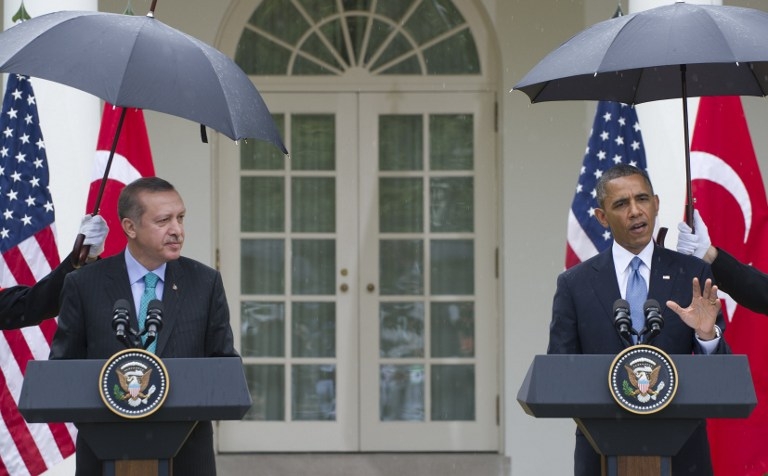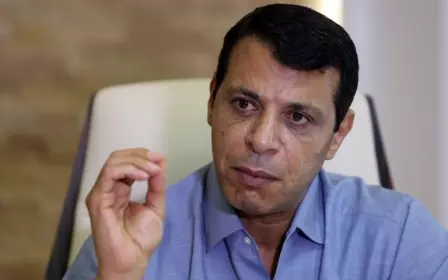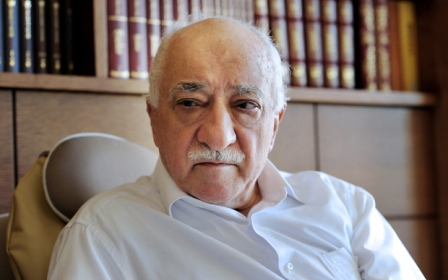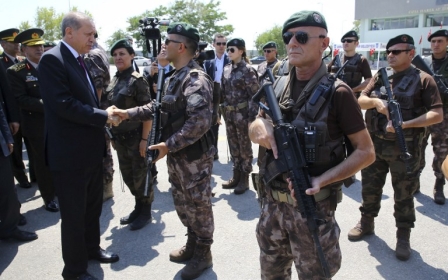Turkish-US coup row is most dangerous yet

Tensions between the US and Turkey in the wake of last month’s failed coup attempt – and US reluctance to extradite the man accused of masterminding the putsch – are only the latest chapter in a fraught history.
The US may or may not have had a direct hand in Fethullah Gulen's activities, but the longer Washington refuses to extradite him, the more Turkish people think that the US is behind the failed coup attempt.
Anti-Americanism is nothing new in Turkey. However, unlike the past half century, this post-coup showdown has the potential to end in a NATO civil war with implications for the entire world.
Relations between the US and Turkey developed after Second Cairo Conference in 1943 during World War Two when US President Franklin Roosevelt, British PM Winston Churchill and Turkish President Ismet Inonu met in the Egyptian capital. The decision to build the Incirlik Air Base – now used by the US-led coalition to launch raids against the Islamic State group in Syria - was made during the meeting, although construction only began in 1951.
After the declaration of the Truman Doctrine in 1947, which reoriented US foreign policy to block the growing Soviet threat at the start of the Cold War, the US established the Counter-Guerilla, a Turkish branch of Operation Gladio – the NATO-led network of secret armies established after WWII to resist a potential Soviet invasion. Truman also feared that a Communist Greece could endanger Turkey’s stability, putting the stability of the entire Middle East on the line.
Turkey participated with UN forces in the Korean War between 1950 and 1953, and joined NATO in 1952 along with Greece. In 1954, Turkey and the US signed a joint use agreement for Incirlik.
NATO and coups
Adnan Menderes, then Turkey’s prime minister, was neither anti-American nor against NATO, but during his tenure, Turkey became too dependent on US aid. Before he was ousted and hanged by a military junta in 1960, Menderes had planned to visit Moscow to seek financial alternatives as NATO wouldn’t let Turkey launch industrial reforms – or even give loans.
After the outbreak of clashes between Greek and Turkish Cypriots – called the Bloody Christmas - in December 1963, US President Lyndon Johnson sent a letter to Turkish Prime Minister Ismet Inonu which essentially told Turkey that if it intervened in Cyprus, there would be consequences - that Washington would not mobilise NATO to help Turkey in the event of a possible Soviet attack. Inonu defiantly told Johnson that “a new world order would be established with Turkey in it”. But in 1965, amid a political crisis, Inonu had to leave his post.
In 1974, defying the US warning, Turkey sent its forces into Cyprus to protect Turkish Cypriots during the Cypriot coup d’etat led by the Cypriot National Guard and the Greek military junta.
Relations between Turkey and US were further damaged after the US imposed an arms embargo on Turkey in 1975, taking sides in the tension between NATO allies Turkey and Greece. It was also one of the fundamental reasons behind the rise of anti-Americanism in Turkey.
What happened to Prime Minister Bulent Ecevit, whose popularity hit the top after Turkish intervention in Cyprus, was no different to his predecessors: he resigned from his post to go to early elections, but a government couldn't be formed for over 200 days, which was followed by a long period of coalitions in Turkey and political chaos. Those years were marked by conflicts between the country’s right and left wings, followed by a military coup in 1980. When Turkish Army Chief Kenan Evren and his co-conspirators stepped in to take control, US President Jimmy Carter was allegedly notified by a CIA officer with great news: “Our boys have done it!”
For the next three years, Turkish Army Forces ruled Turkey through the National Security Council. Fifty people were executed, half a million were arrested and hundreds died in prison before Turkey went to election.
Turkey’s economic rise
Turgut Ozal, who became prime minister in 1983, was an important figure in Turkey’s transition to a neo-liberal economy and also transformed Turkey’s politics, culture and foreign affairs. Just before he died in 1993 of a suspicious heart attack – which some suspect may have been an assassination - he had been seeking ways in his role as president to negotiate with the outlawed Kurdistan Workers’ Party (PKK) to end the Kurdish-Turkish conflict, a move that would change the Middle East's fate.
Over the next nine years, Turkey was ruled by eight different governments, including seven coalitions, which oversaw economic crises, instability and political chaos. Founded in 2001, the Justice and Development Party (AK Party) won a majority in 2002 elections. With its successful liberal economic and social conservative agenda, the AKP and its charismatic leader Recep Tayyip Erdogan won the next elections, increasing its votes. Turkey was on the rise again.
US-Turkish relations, however, faced turbulence once again. In January 2003, after the US decision to invade Iraq, Turkey invited countries from the region to a last-chance meeting to urge Iraq to cooperate with the UN inspections and to avert a US-led war. On 1 March 2003, the Turkish Parliament rejected a proposal to allow more than 60,000 US troops to operate from Turkish bases and ports in the event of the war, causing a wave of criticism in the US. A couple of months later, US troops attacked Turkish soldiers in Sulaymaniyah, arresting 11 who were returned to Turkish custody after several days, fuelling anti-American sentiment in Turkey once again.
The parallel state
In 2007, a probe into Ergenekon - an alleged clandestine, ultra-nationalist organisation which was thought to have members in the military and armed forces and was responsible for many acts of political violence in Turkey - was launched. Hundreds of soldiers, including generals, were arrested and dismissed in the Ergenekon trials and the Sledgehammer trials that followed in which the defendants were charged with forming a secularist military elite in the Turkish army, planning to stir up chaos and justify a military coup.
At the time, many believed that with Ergenekon, Turkey was purging the Counter-Guerilla that had been established under the Truman Doctrine and had been subsequently marginalised in the post-Cold War era.
But later, it was understood that the documents for alleged crimes were fake, the evidence were planted by a Gulenist network. The victims were pardoned. Officers, prosecutors and judges, who were loyal to Fethullah Gulen, the self-styled Muslim cleric who has lived in self-imposed exile in the US since 1999, and pushed the Ergenekon cases towards conviction, were charged with plotting against the Turkish army. In Turkey, many saw the US support for the Ergenekon trials at the time as retribution for the Turkish army’s rejection to join the war in Iraq. But now some say it looks like more than that.
Turkey was harshly criticised when it started to remove Gulen loyalists in the state apparatus in 2013. The Gulenist network was accused of attempting a judicial coup and building a parallel state and, in 2015, Gulen was put on Turkey’s terrorist list.
Although concerns about plots within the army dissipated, a Gulenist coup attempt was still anxiously expected as high-ranking soldiers loyal to Gulen took the place of those who had been dismissed during the Ergenekon and Sledgehammer trials. And on 15 July, they tried. Fortunately, they failed.
In order to get a pretext for a coup, Gulenists adopted a strategy of tension, escalated conflicts in Turkey, ruined Turkey’s image worldwide, all elements that the US chose to overlook. Even during the coup attempt, the Obama administration waited to see what would be successful.
In the aftermath of the coup attempt, Washington is still allowing Gulen and his network to remain in the US. Washington might think that Gulen can be trusted to work for US interests, but recalling past experiences, Turkish people are now more anti-American than ever.
It’s not about Erdogan, it’s not about freedoms and rights, and it’s not about democracy. Even the harshest critics of Erdogan today are starting to ask themselves if they were deceived into believing a huge campaign of anti-Erdogan propaganda.
Washington should stop pushing to transform Turkey in line with its Middle East policies, as Turkey is not as weak as it once was. US manoeuvres against Erdogan may hurt Turkey, but they can also open a Pandora's box leading to a NATO civil war that could spread quickly and hurt us all.
- Merve Sebnem Oruc is a managing editor in online journalism, a commentator and a columnist in Turkey. She focuses on Turkish politics and diplomacy, Arab-Israeli relations and the Middle East politics. She tweets @mervesebnem.
The views expressed in this article belong to the author and do not necessarily reflect the editorial policy of Middle East Eye.
Photo: US President Barack Obama and Turkish Prime Minister Recep Erdogan hold a joint press conference in the Rose Garden of the White House in Washington, DC, 16 May 2013 (AFP)
New MEE newsletter: Jerusalem Dispatch
Sign up to get the latest insights and analysis on Israel-Palestine, alongside Turkey Unpacked and other MEE newsletters
Middle East Eye delivers independent and unrivalled coverage and analysis of the Middle East, North Africa and beyond. To learn more about republishing this content and the associated fees, please fill out this form. More about MEE can be found here.





